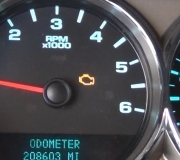Story: I was driving my Galant on the highway today and I noticed that when I needed to slow down slightly, as I was coming up behind a car, that the car would "jump / jerk" when I removed pressure to the accelerator. I have experienced this problem before, but this has been the first time I have noticed it in a while, you know how that goes *haha* I was actually wondering if this has something to do with the transaxle, suspension or the engine because I need to make sure it is nothing too big. The problem occurs between the 70-80 mph range, but not between 0-50 or 80-100. Strange? Let me know what it could be, and what I will need to do to have it stop doing this. Pretty sure this isn't a thing a "normal" car would do! I have the following hunches on what it could be:
bad transaxle solenoid or something to do with overdrive?
misfire?
torque converter issues?
old fluid in the transmission?
failing computer causing major gear hunting?
ideas!
Thanks in advance for a great answer ;D
~Alec
Saturday, October 16th, 2010 AT 10:24 PM


